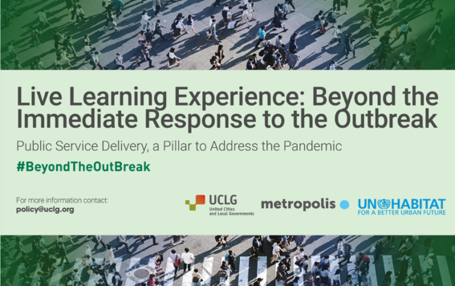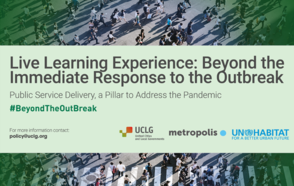
#BeyondTheOutbreak
Barcelona, Spain and Nairobi Kenya, 26 March 2020 - More than 20 representatives of local and regional governments and partners, gathered online with civil society and the United Nations to exchange experiences on the response to the COVID-19 pandemic.
Participants included the Mayor of Al-Hoceima who is the UCLG President, the Executive Director of UN-Habitat, Deputy Mayors from Barcelona, Rome and Madrid, representatives from Guangzhou, Bogota, Buenos Aires, Montevideo, Xi’an, Durban, Lampedusa and Tehran, and the UN Special Rapporteur on the right to adequate housing.
The virtual meeting was the launch of a live learning series co-convened by UCLG, Metropolis and UN-Habitat to facilitate the exchange of ideas and experiences between local and regional governments on their critical role in this unprecedented situation.
The online live learning session, which attracted over 100 participants, showcased the indispensable, multiple roles played by local and regional governments, public servants and health officials in ensuring equitable service delivery and ensuring the rights of all are respected during the crisis. Speakers emphasized that the global response to the pandemic must be based on local realities, needs, and solutions.
UCLG Secretary General Emilia Saiz, who moderated the meeting, stated that with millions of people ordered to stay at home around the world, local governments are ensuring that the public service delivery that underpins health services are resilient. This community, she highlighted, needs to look at ahead and discuss how to “protect public servants and the most vulnerable to ensure cohesion in the future”.
The meeting was opened by UCLG President and Mayor of Al-Hoceima (Morocco), Mohamed Boudra, and UN-Habitat Executive Director, Maimunah Mohd Sharif.
They both commended the work of local and regional governments and underlined the importance of local service provision during the global outbreak.
“Local governments of cities and regions are closest to communities. Their resilience is our strength and source of inspiration. We need to build on this special relationship and I believe that together we can discover the solutions we need,” said UN-Habitat’s Executive Director.
The UCLG President added: “Local and regional authorities are going to change the system of governance, and we are seeing it day by day, as they are on the frontline, responding to the crisis and communicating about it with their citizens”.
The local and regional leaders agreed to place the needs of citizens and the resilience of communities at the centre of their actions. Participants called for all levels of society to work together to prevent the spread of COVID-19, address its impact and use the lessons learned to create a more resilient world.
The UN Special Rapporteur on the right to adequate housing, Leilani Farha, said the pandemic showed that the global housing crisis could be addressed.
“Suddenly governments are able to find places and spaces for people living in homelessness, we are able to provide water and sanitation, we are getting rate abatements and can lessen mortgage payments. Suddenly we are saying no evictions.”
The Cities for Global Health Platform was presented by Octavi de la Varga, Secretary General of Metropolis, as an online space for cities to share knowledge and expertise for future crises. The openness and collaborative format of the initiative was highlighted.
The live learning meetings will continue initially with weekly sessions on Wednesdays during the crisis. In the first month, key issues such as housing in crisis, mobility and access to technology in service delivery during the current crisis will be covered as cities around the world are already looking at how to overcome challenges with a new generation of solutions.
- Download the full press release











